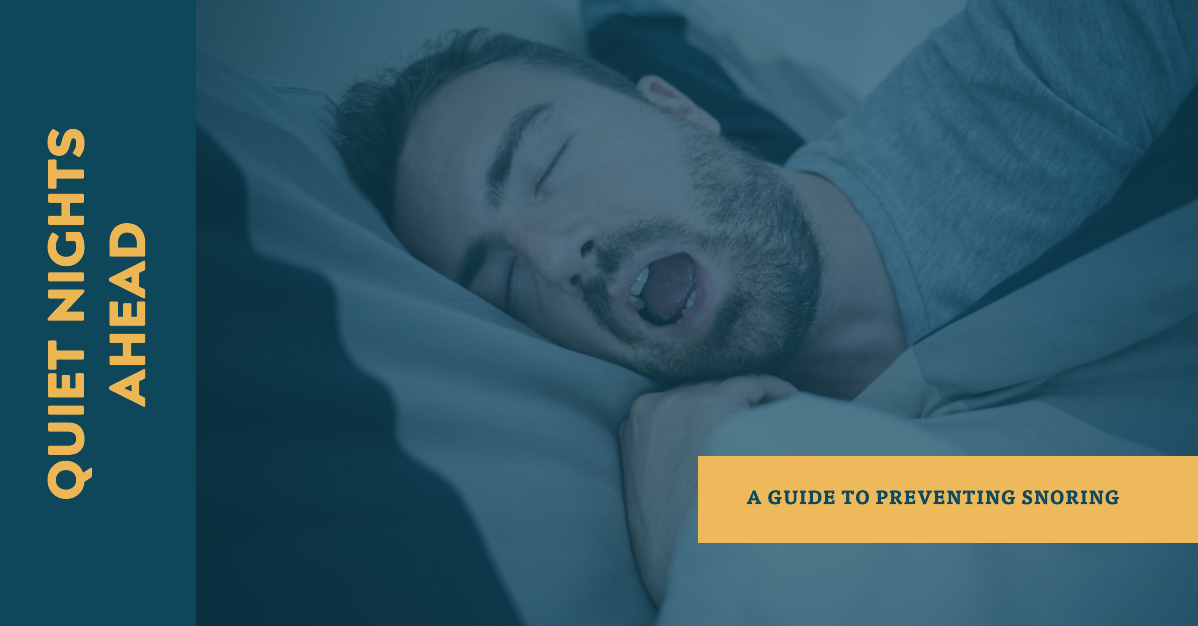The Sleep Struggle: Why We Snore and How to Silence It
Are you or a loved one struggling with the nightly serenades of a snoring partner? You're not alone. In this detailed exploration of snoring, we delve deep into the reasons behind this common sleep disturbance and offer practical solutions to help you and your loved ones sleep soundly once more.

Ah, the sweet serenity of a quiet night's sleep. It's something many of us crave but often find elusive, especially when there's a snorer in the house. The relentless symphony of snores can turn a peaceful slumber into a nightly battle. But fret not, for we're about to unravel the mystery behind snoring and equip you with the knowledge and tools to silence it.
The Sleep Struggle
Before we jump into solutions, let's first understand the sleep struggle that is snoring. Imagine this: you've had a long, exhausting day, and all you want is to sink into the embrace of your bed and drift into dreamland. But as you close your eyes, you're greeted by a cacophony of sounds that resemble a chainsaw cutting through a forest.
Yes, snoring can be that disruptive. It's not just a nuisance; it can impact your health, relationships, and overall quality of life. But what causes this nightly symphony, and why do some people seem to snore like a freight train while others slumber in blissful silence?
The Science of Snoring
To understand why we snore, we need to get to the root of the issue. Snoring happens when the air passing through your mouth and nose gets somewhat blocked while you're sleeping. This blockage leads to the tissues in the throat vibrating as we breathe, creating the characteristic snoring sound.
Several things play a part in causing this blockage in your airways, including:
-
Relaxed Muscles: When we sleep, the muscles in our throat and tongue relax, narrowing the airway.
-
Obesity: Excess weight, especially around the neck, can put pressure on the airway, making snoring more likely.
-
Alcohol and Sedatives: These things make the muscles in your throat chill out, making it more likely for you to snore.
-
Nasal Congestion: Anything that obstructs nasal passages, like allergies or a deviated septum, can lead to snoring.
-
Sleep Position: Sleeping on your back can cause your tongue and soft palate to collapse to the back of your throat, creating an obstruction.
-
Age: As we age, our throat becomes narrower, and muscle tone decreases, making snoring more common.
The Health Implications
Snoring isn't just an annoyance; it can have significant health implications. One of the most severe conditions associated with snoring is sleep apnea. Sleep apnea is a condition where your breathing pauses and starts again repeatedly while you're sleeping. It can lead to a range of health problems, including:
- High blood pressure
- Heart disease
- Stroke
- Daytime fatigue and drowsiness
- Difficulty concentrating
- Mood disturbances
In addition to sleep apnea, chronic snoring can also contribute to a lower quality of sleep, leaving you feeling groggy and irritable during the day. It's not just the snorer who suffers; their sleep-deprived partner can experience similar daytime issues, leading to relationship strain.
Breaking the Silence: Tips to Stop Snoring
Now that we've uncovered the why behind snoring let's explore the all-important how to silence it. Here are some effective strategies to help you or your loved one get a quieter, more restful night's sleep:
-
Lifestyle Modifications:
-
Weight Management: If you're overweight, shedding those extra pounds can significantly reduce snoring.
-
Sleep Position: Encourage sleeping on the side rather than the back. You can use body pillows or specialized anti-snoring pillows to help maintain this position.
-
Avoid Alcohol and Sedatives: Limiting alcohol and sedative consumption before bedtime can prevent muscle relaxation in the throat.
-
-
Nasal Remedies:
-
Clear Nasal Passages: Use saline nasal sprays or a nasal irrigation system to keep your nasal passages clear.
-
Nasal Strips: Over-the-counter nasal strips can help improve airflow and reduce snoring.
-
-
Oral Appliances:
- Mouthguards and Mandibular Advancement Devices (MADs): These devices reposition the jaw and tongue to keep the airway open.
-
Medical Interventions:
-
Continuous Positive Airway Pressure (CPAP): CPAP machines are commonly prescribed for sleep apnea but can also be effective for severe snoring. These machines send a steady flow of air through a mask to make sure your airway stays clear and open.
-
Surgery: In extreme cases, surgery may be recommended to correct anatomical issues causing snoring.
-
-
Professional Help:
- Consult a healthcare professional or sleep specialist if snoring is severe or accompanied by other concerning symptoms.
Conclusion
The sleep struggle with snoring is a battle many of us face, but armed with knowledge and a variety of remedies, we can win the war against disrupted sleep. Remember, snoring isn't just a nuisance; it can signal underlying health issues that need addressing.
So, if you or a loved one is dealing with snoring, don't suffer in silence. Make a move to enhance the quality of your sleep and your overall well-being. With the right approach, you can look forward to peaceful nights and energized days, and perhaps even rekindle the harmony in your relationships that snoring threatened to disrupt.










